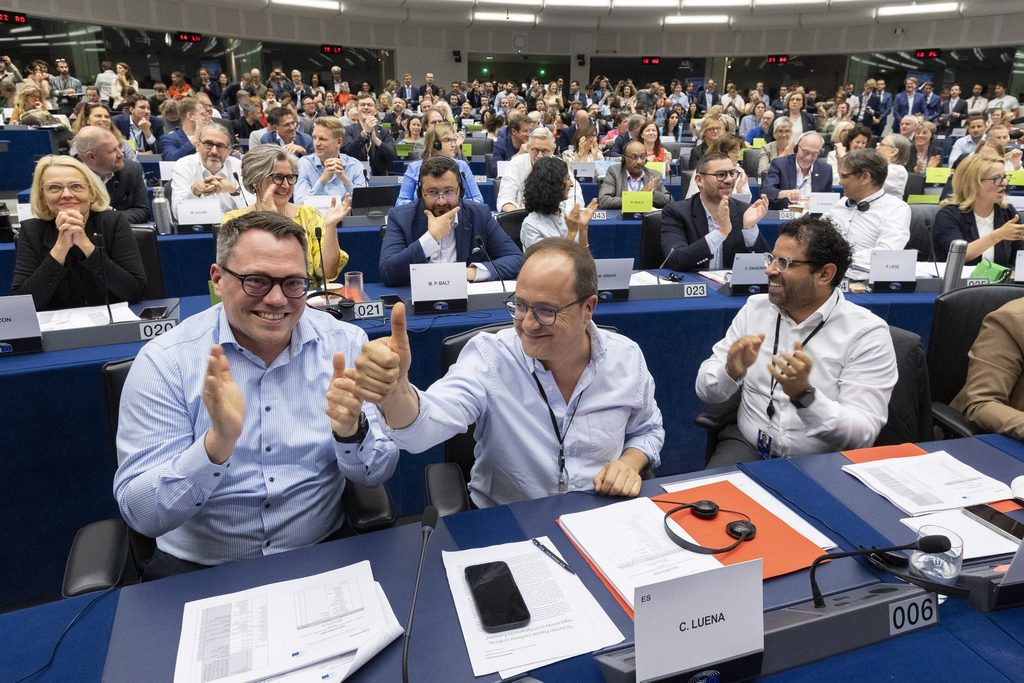After a three-hour voting session on Thursday, the hotly-debated EU nature restoration law remains in limbo, not adopted nor rejected, until the next meeting of the environment committee on June 27.
In the morning, a strong push from the European People's Party (EPP) to reject the law altogether came to a tie of 44 to 44, which prompted the committee to vote individually on hundreds of amendments.
MEPs had to go through a 245-page text but eventually ran out of time. A 15-minute extension was granted but did not suffice. Most amendment votes were equally close.
The meeting of the European Parliament's environmental committee (ENVI) was not legally allowed to continue, prompting a postponement of the final vote. The MEPs had to go on to attend the plenary meeting of the European Parliament.
Supporters and opponents alike clamoured to make a victory out of the political impasse.
The vice-chair of the EPP, Esther de Lange, said that the three-hour voting time and lack of majority mean that it is time for EU Commission Vice-President Frans Timmermans "to get the message" and withdraw the legislation, as they did when they walked out of the negotiations, three weeks ago.
The Greens/EFA group took to social media to say that the "EPP failed in their sad attempt" to reject the law.
"Chaos. But we didn’t manage to conclude our voting today," wrote Greens MEP Bas Eickhout on Twitter. "Most important of today is that there is no majority to reject the Nature Restoration Law. We need time to still find a common position though."
After 3 hours of voting the numbers of the day are 44:44 - it looks like there is no majority for the ENVI report on the Nature Restoration Law. The fisheries and agriculture committee already rejected it. When will Frans Timmermans get the message? This is not the way!
— Esther de Lange (@Esther_de_Lange) June 15, 2023
The key biodiversity legislation had previously been rejected in the agriculture and fisheries committees, making the ENVI vote, the leading committee on the file, all the more important as a rejection would essentially kill the deal.
If accepted, the text will be sent along for a plenary vote in the European Parliament in July. A tie in the final vote of the environmental committee also endangers the bill.
The razor-tight vote comes after weeks of conflicts around the EU nature restoration law, with the European People's Party fiercely opposing the law, claiming it would harm European farmers and create severe food insecurity.
In a letter published this week, over 3,330 scientists expressed that such arguments go against scientific evidence.
The previous committee rejections came as liberal MEPs from the Renew group aligned with the EPP's hard stance against the nature restoration proposal. However, during the last round of negotiations at the end of May, Renew agreed to support the text after a few compromise measures.
'Flip-flops of ecology'
Due to the composition of the committee, much of the decision-making weight falls on the shoulders of liberals from Renew and non-attached members, whom the environmental nonprofit organisation BLOOM classified as the "flip-flops of ecology" in the European Parliament, due to their ambiguous stances on climate regulation.
The nature restoration proposal is also creating tensions in the Council, the other EU legislative institution alongside the Parliament. The Swedish presidency of the Council is reportedly trying to postpone the discussion of the text by Member States' environment ministers, according to Belga News Agency. The discussion is scheduled for 20 June.
Environmental groups and scientists hail the nature restoration law as a necessary regulation to create and protect resilient ecosystems in the face of the worsening climate crisis.
Last minute push to get MEPs to support the nature restoration regulation: Environmental groups and green MEPs protest in front of the European Parliament in Strasbourg. pic.twitter.com/y3ZPovRMHR
— Louise Guillot (@l_guillot) June 15, 2023
The law would enact the first-ever legally binding targets on fauna and flora restoration. The proposal aims for 20% of the EU's seas and lands need to be covered by protection measures by 2030.
The EPP, the largest party in the European Parliament, has been vehemently campaigning against the bill.
Party leader Manfred Weber was accused of blackmailing MEPs on Wednesday ahead of today's vote to get them to oppose the law. The accusations came from ENVI chair and Renew MEP, Pascal Canfin, and were followed by the only vocal EPP supporter of the bill withdrawing from Thursday's vote.
Weber denied the allegations, with his spokesperson calling them a "desperate" attempt to distract from the law's problems.
A test for the European Green Deal
The backlash around nature restoration regulations marks a critical point in the EU Green Deal, as scepticism on climate action seems to ramp up, from European and national leaders alike.
Related News
- 'Bullied into voting': EPP chief accused of blackmailing MEPs over nature restoration law
- Nature restoration law: EU's von der Leyen willing to relax regulations
- Belgian centrists undecided on following EPP line against EU nature restoration law
In May this year, French President Emmanuel Macron called for a pause on environmental regulations in order to preserve economic competitiveness with the rest of the world. Macron's government nevertheless supports the nature restoration law, with fellow party member Pascal Canfin defending this as "an unfortunate phrasing", according to Le Monde.
Less than two weeks later, Belgian Prime Minister Alexander De Croo called for a similar pause on climate plans, echoing the Flemish's right opposition to the nature restoration law.
A rejection of the bill would be the first Green Deal legislation to fail in the European Parliament.

